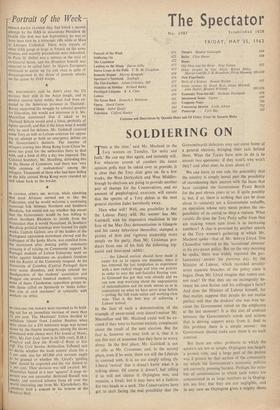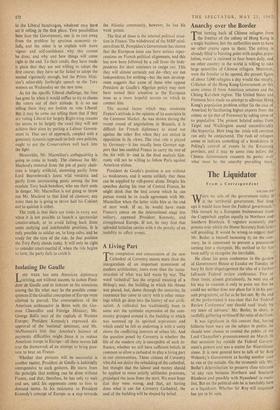SOLDIERING ON
`fTIHIS is the time,' said Mr. Macleod to the TTory women on Tuesday, 'for unity and faith.' He can say that again, and certainly will. For whatever crumb of comfort the latest opinion polls may be raked over to provide, it is clear that the Tory slide goes on. In a few weeks, the West Derbyshire and West Middles- brough by-elections are going to provide another pair of thumps for the Conservatives, and no amount of psephological exorcism will ensure that the spectre of a Tory defeat at the next general election fades harmlessly away.
Then what will? Well, one possibility is that the Labour Party will. No sooner has Mr. Gaitskell, with his impressive resolution in the face of the May Day demonstration in Glasgow and his canny behaviour thereafter, stamped a picture of firm and vigorous leadership more aeeply on his party, than Mr. Crossman pro- duces from one of his hats the following lop- eared and boss-eyed rabbit: . . . the Liberal revival should have made it easier for us to regain our dynamic, since it has removed the last temptation to experiment with a new radical image and trim our policies in order to woo the anti-Socialist floating vote. Jo Grimond has got that vote already and we can now stop worrying about the unpopularity of nationalisation and the trade unions so as to concentrate on what we have never done before —polling the full trade union and working-class vote. That is the best way of achieving a Labour revival.
In the face of such a demonstration of the triumph of never-mind over doesn't-matter Mr. Macmillan and Mr. Macleod could well be ex- cused if they were to become entirely complacent about the result of the next election. But the fact is, however we may look at it, that it is not this sort of nonsense that they have to worry about. In the first place, Mr. Gaitskell is not so silly as Mr. Crossman; and, in the second place, even if he were, there are still the Liberals to contend with. It is no use simply telling the Liberal 'revival' that it doesn't know what it is talking about. Of course it doesn't, but telling it so will not silence it. Orpington was, and remains, a freak; but it may have set a fashion for two heads to a neck. The Conservatives have got to start facing the real possibility that the Grimondwards defectors may not come home ai a general election, bringing their tails behind them. What the Tories have now to do is to answer two questions: if they won't, why won't they? and what must be done about it?
We can leave to one side the possibility that the country is simply bored past the possibility of reawakening their interest with the faces that have occupied the Government Front Bench for the past eleven years or so. It quite possibly is, but, if so, there is nothing that can be done about it—certainly not a Government reshuffle, an operation whose very name proVes the im- possibility of its curing so deep a malaise. What curable ills does the Tory Party suffer from that are making voters turn from it in increasing numbers? A clue is provided by another speech at the Tory women's gathering at which Mr. Macleod spoke—that of Mr. Selwyn Lloyd. The Chancellor referred to the 'occasional reverses' in his pay-pause policy. But on the very morning he spoke, there was widely reported the par- liamentary answer the previous day, by the Minister of Labour, which recorded seventy- seven separate breaches of the policy since it began. Does Mr. Lloyd imagine that voters can- not read? Or that they see no incongruity be- tween his own fiction and his colleague's facts? And does the Minister of Labour himself, for that matter, suppose that people do not realise perfect well that the dockers' rise was won be- cause the Government ratted on the employers at the last moment? It is this sort of contrast between the Government's words and actions that is driving support away from it. And to this problem there is a simple answer: the Government should make sure there is no such contrast.
But there are other problems to which the answers are not so simple. Orpington was largely a protest vote, and a large part of the protest was a protest by that section of the community on which' the Government's economic policies are currently pressing hardest. Perhaps the num- ber of constituencies in which such voters are concentrated in as large numbers as in Orping- ton are few; but they are not negligible, and in any case an Orpington gives a mighty shove to the Liberal bandwagon, whatever may have set it rolling in the first place. Two possibilities here face the Government; one is to run away from the problem by spurious economic re- liefs, and the other is to explain with more vigour and self-confidence why this cannot be done, and why and how things will come right in the end. To their credit, they have made it plain that they are not willing to adopt the first course; they have so far failed to adopt the second vigorously enough, but the Prime Mini- ster's admirably forthright speech to the Tory women on Wednesday set the new tone.
As for the specific Liberal challenge, the time has gone by when it would suffice to try to shame the voters out of their attitude. It is no use telling them they are foolish to vote Liberal. But it may be some use telling them that if they are voting Libbral for largely Right-wing reasons (as seems to be largely the case) they will not achieve their aims by putting a Labour Govern- ment in. That sort of approach, coupled with a genuinely dynamic approach to their own policies, ought to put the Conservatives well back into the fight.
Meanwhile, Mr. Macmillan's unflappability is going to come in handy. The clamour for Mr. Macleod's removal from the job of party chair- man is largely artificial, stemming partly from Lord Beaverbrook's latest wild vendetta and partly from unreasoning panic among the less resolute Tory back-benchers, who see their seats in danger. Mr. Macmillan is not going to throw out Mr. Macleod to that kind of clamour, any more than he is going to throw half his Cabinet out to quieten it either.
The truth is that there are times in every war when it is not possible to launch a spectacular counter-attack, or to avoid falling back from some outlying and indefensible positions. It is only possible to soldier on, to keep calm, and be ready for the turn of the tide. In that position the Tory Party stands today. It will only be right to consider court-martial if, when the tide begins tc turn, the party fails to catch it.







































 Previous page
Previous page